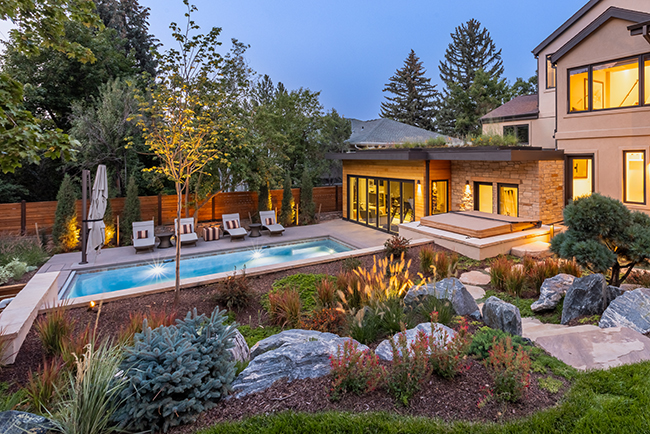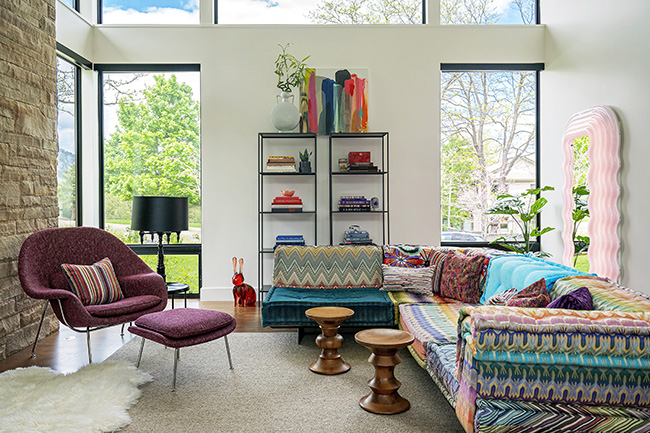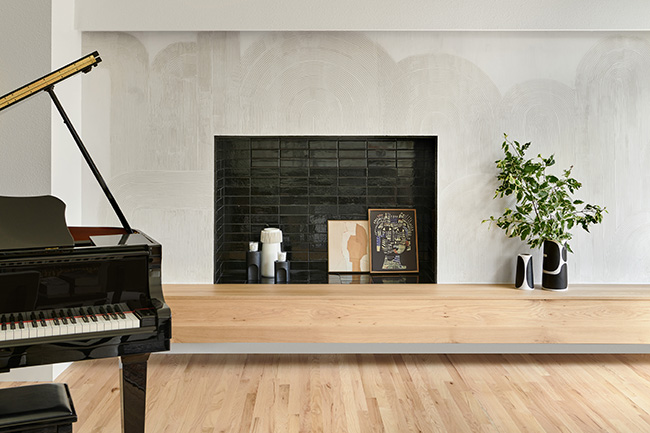Feature Home: After the Big One
03 Jan 2016
A couple who lost everything in the 2013 flood gained it back through the charity of friends and strangers, and their own resilient spirits.
By Lisa Marshall At 4:50 a.m. on Sept. 12, 2013, a ringing phone jolted Ben Rickard awake: School was canceled for his 17-year-old daughter, due to rain. Annoyed, he rolled over to go back to sleep. “I thought, ‘I guess they’re just canceling school for anything these days,’” he recalls. But once his wife, Shannon Rood, tried to step outside, reality struck.



 Foot-deep water pushed against their front door and brown waves crashed across their flat, typically arid 7-acre property in Niwot. The split-rail fences they’d spent years installing—to keep their pig, goat, 10 chickens and three dogs from roaming—floated by, alongside massive cottonwood branches and uprooted fruit trees they’d planted.
Left Hand Creek had breached its banks amid the heaviest rainfall in Boulder County’s history. Their dream property was directly in its new path, and as the sun came up, the water was rising fast. “I said, ‘Shannon, we’ve got to go NOW,’” Ben recalls. They grabbed one Tupperware box of important documents, dropped off their 150-pound pig, Geraldine, at the fenced higher-ground Niwot Cemetery across the street, and bade a sad farewell to their missing goat, Barry. Then they drove away. “We had just lost everything,” Ben says.
Or so it seemed.
Fast-forward two years and thanks to the generosity of a long list of strangers, and heaping amounts of their own sweat equity, the couple and their menagerie of animals are back at home in a sleek and modern new house, with one hell of a story to tell. “They say tragedy brings out the best and the worst in people,” Shannon says. “We’ve seen the best.”
Foot-deep water pushed against their front door and brown waves crashed across their flat, typically arid 7-acre property in Niwot. The split-rail fences they’d spent years installing—to keep their pig, goat, 10 chickens and three dogs from roaming—floated by, alongside massive cottonwood branches and uprooted fruit trees they’d planted.
Left Hand Creek had breached its banks amid the heaviest rainfall in Boulder County’s history. Their dream property was directly in its new path, and as the sun came up, the water was rising fast. “I said, ‘Shannon, we’ve got to go NOW,’” Ben recalls. They grabbed one Tupperware box of important documents, dropped off their 150-pound pig, Geraldine, at the fenced higher-ground Niwot Cemetery across the street, and bade a sad farewell to their missing goat, Barry. Then they drove away. “We had just lost everything,” Ben says.
Or so it seemed.
Fast-forward two years and thanks to the generosity of a long list of strangers, and heaping amounts of their own sweat equity, the couple and their menagerie of animals are back at home in a sleek and modern new house, with one hell of a story to tell. “They say tragedy brings out the best and the worst in people,” Shannon says. “We’ve seen the best.”
(Don’t) Ask and You Shall Receive
The couple met at the Humane Society of Boulder Valley in 2001, drawn together by a mutual love of animals and a similar dream of owning a big property where they could have lots of them someday. They got married and started a Boulder business, the Dog Spot Dog Daycare and Boarding, in 2004.
 Four years later, they sank their savings into a funky fixer-upper on a sprawling property with sweeping views of the Front Range. By the eve of the flood, they’d installed a new sprinkler system, built a fence and a barn for the animals, and turned the large cinder-block outbuilding into a hangout where Ben could play guitar with friends and his band. A brand-new Toyota 4Runner sat in the driveway.
Post-flood, the 4Runner was totaled, all their photos and personal belongings were gone, and their home, while still standing, was uninhabitable. For weeks, the two slept on the floor of their business and bathed in the dog-grooming tub.
At first, they were hopeful they could save their house. With the help of volunteers, including cyclists and motorists who often stopped to help when they passed by and saw the devastation, the couple ripped out the carpet and drywall and shoveled out tons of mud. At one point, they hired a mold-mitigation company. But when a concerned construction-savvy neighbor saw that company’s truck outside, he stormed over and threw the workers out, fearing the couple was being taken advantage of. “He told this dude, ‘You shut this operation down now and stop charging these people,’” Ben recalls. In reality, the house was a total loss.
Four years later, they sank their savings into a funky fixer-upper on a sprawling property with sweeping views of the Front Range. By the eve of the flood, they’d installed a new sprinkler system, built a fence and a barn for the animals, and turned the large cinder-block outbuilding into a hangout where Ben could play guitar with friends and his band. A brand-new Toyota 4Runner sat in the driveway.
Post-flood, the 4Runner was totaled, all their photos and personal belongings were gone, and their home, while still standing, was uninhabitable. For weeks, the two slept on the floor of their business and bathed in the dog-grooming tub.
At first, they were hopeful they could save their house. With the help of volunteers, including cyclists and motorists who often stopped to help when they passed by and saw the devastation, the couple ripped out the carpet and drywall and shoveled out tons of mud. At one point, they hired a mold-mitigation company. But when a concerned construction-savvy neighbor saw that company’s truck outside, he stormed over and threw the workers out, fearing the couple was being taken advantage of. “He told this dude, ‘You shut this operation down now and stop charging these people,’” Ben recalls. In reality, the house was a total loss.
 With no flood insurance, meager FEMA assistance, and no way of qualifying for a second high-interest mortgage, they toyed briefly with the idea of letting their property go into foreclosure and filing for bankruptcy. But it didn’t feel right. When a client’s parents offered them a place to stay for several months, they almost turned it down. “We don’t ask people for help. That’s just not our thing,” Ben says.
But the help came anyway. A neighbor, Left Hand Excavating owner Doug Lyle, showed up with a backhoe to help them tear down the old house. The Small Business Administration gave them a very low-interest loan to help them rebuild. A man from Left Hand Water District knocked on the door and handed them a $500 check “no questions asked.” A friend set up a GoFundMe page for them, and -strangers sprang to their aid. “A little girl insisted on giving us money from her piggy bank, and a woman appeared at our door with a pizza and a hundred bucks,” Ben says.
With no flood insurance, meager FEMA assistance, and no way of qualifying for a second high-interest mortgage, they toyed briefly with the idea of letting their property go into foreclosure and filing for bankruptcy. But it didn’t feel right. When a client’s parents offered them a place to stay for several months, they almost turned it down. “We don’t ask people for help. That’s just not our thing,” Ben says.
But the help came anyway. A neighbor, Left Hand Excavating owner Doug Lyle, showed up with a backhoe to help them tear down the old house. The Small Business Administration gave them a very low-interest loan to help them rebuild. A man from Left Hand Water District knocked on the door and handed them a $500 check “no questions asked.” A friend set up a GoFundMe page for them, and -strangers sprang to their aid. “A little girl insisted on giving us money from her piggy bank, and a woman appeared at our door with a pizza and a hundred bucks,” Ben says.


 “From free services to volunteer work, to shelter, to countless cookies, treats, meals, gift cards, cash, checks, care packages from afar, hugs, tears and words of encouragement, you have lifted us up, refusing to allow us to stay down,” Ben wrote on their GoFundMe page.
A highly coveted general contractor, Tom Stanko, offered to waive the fee for his time. And then his subcontractors started showing up at the jobsite with free insulation, windows and solid 9-foot doors. “When I first met Ben and Shannon, I was truly overwhelmed,” recalls Stanko, cofounder of Harrington Stanko Construction in Longmont. “You have two people who were dealt a disastrous blow and instead of complaining, their attitude was, ‘We are going to move ahead as positively as we possibly can.’ We tried to help in any way we could, and we took away far more from the experience than we gave.”
“From free services to volunteer work, to shelter, to countless cookies, treats, meals, gift cards, cash, checks, care packages from afar, hugs, tears and words of encouragement, you have lifted us up, refusing to allow us to stay down,” Ben wrote on their GoFundMe page.
A highly coveted general contractor, Tom Stanko, offered to waive the fee for his time. And then his subcontractors started showing up at the jobsite with free insulation, windows and solid 9-foot doors. “When I first met Ben and Shannon, I was truly overwhelmed,” recalls Stanko, cofounder of Harrington Stanko Construction in Longmont. “You have two people who were dealt a disastrous blow and instead of complaining, their attitude was, ‘We are going to move ahead as positively as we possibly can.’ We tried to help in any way we could, and we took away far more from the experience than we gave.”
Framing the Issue
The couple hired David Barrett, of Boulder’s Barrett Studio Architects, after getting a recommendation from an acquaintance who had lost her house in a fire and hired him to design the new one. Barrett is known for clean, modern layouts that take advantage of a property’s surroundings, and he knew how to work within their tight budget.

 “They aren’t attached to material things as much as just the space,” Barrett says. He suggested they rebuild farther away from the road in a spot that took better advantage of their views of the Flatirons and Longs Peak. And he kept it simple, using a 2,000-square-foot L-shaped design, shed roof, and utilitarian materials like corrugated metal and painted HardiePanel siding.
To save on labor, Shannon and Ben built much of the house with their own hands. He would come home after a 13-hour-day at their business to pound nails with the lone framer helping them build their walls. She spent her days off operating a backhoe and a crane. “At the time it felt so exhausting,” Shannon says. “But now we look back on it and say, ‘Look what we did!’ It was just awesome.”
“We always had a great relationship, but we never had anything that really challenged us,” Ben adds. “It’s a powerful thing to know that even when you are knocked flat, that person is going to be right there beside you.”
“They aren’t attached to material things as much as just the space,” Barrett says. He suggested they rebuild farther away from the road in a spot that took better advantage of their views of the Flatirons and Longs Peak. And he kept it simple, using a 2,000-square-foot L-shaped design, shed roof, and utilitarian materials like corrugated metal and painted HardiePanel siding.
To save on labor, Shannon and Ben built much of the house with their own hands. He would come home after a 13-hour-day at their business to pound nails with the lone framer helping them build their walls. She spent her days off operating a backhoe and a crane. “At the time it felt so exhausting,” Shannon says. “But now we look back on it and say, ‘Look what we did!’ It was just awesome.”
“We always had a great relationship, but we never had anything that really challenged us,” Ben adds. “It’s a powerful thing to know that even when you are knocked flat, that person is going to be right there beside you.”
Happy Ending for All
Today, life is starting to feel normal again, they say, as they tour a visitor around a modestly sized home that feels bigger than it is. High ceilings with a clerestory and glass walls on the southwest lend a spacious, cheery feel. The concrete floors are easy to keep clean, despite the many muddy paws that tread on them.
 In the pasture just south of the house roam their dogs, cat, chickens, pig and even that presumably lost goat, Barry. (He miraculously turned up in the cemetery 36 hours post-flood, thanks to a neighbor who placed him there after he found Barry breathing through an air hole amid floodwaters filling a stall.) On another corner of the property, where their first house once stood, towers their old stone chimney—a powerful memento of all that they’ve been through.
“The worst of humanity often gets the headlines,” Ben says, his voice catching as he looks out on that chimney. “But the bottom line is: People are awesome.”
In the pasture just south of the house roam their dogs, cat, chickens, pig and even that presumably lost goat, Barry. (He miraculously turned up in the cemetery 36 hours post-flood, thanks to a neighbor who placed him there after he found Barry breathing through an air hole amid floodwaters filling a stall.) On another corner of the property, where their first house once stood, towers their old stone chimney—a powerful memento of all that they’ve been through.
“The worst of humanity often gets the headlines,” Ben says, his voice catching as he looks out on that chimney. “But the bottom line is: People are awesome.” 











